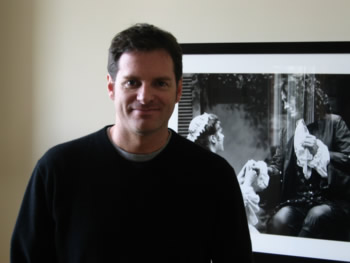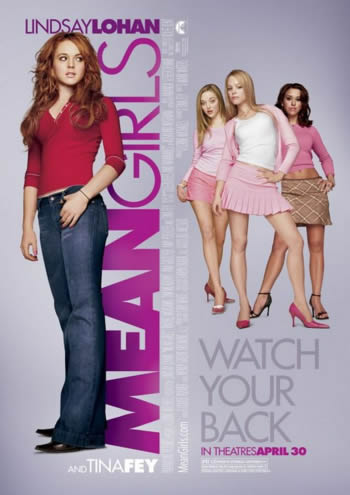Movies

New Releases • A-D • E-H • I-P • Q-Z • Articles • Festivals • Interviews • Dark Knight • Indiana Jones • John Wick • MCU
Mark Waters
The Making of Mean Girls
For Mark Waters, hanging out with plastic women, people who get a sexual charge out of reenacting JFK's assassination, and teenagers who act like African wildlife is all a part of the job.
Literally.

Clad in wrap-around sunglasses, close-cropped hair, a 12 O'clock shadow, black sweatshirt, blue jeans and black Nikes, there's nothing to give away the fact that he's a movie director. Not even the mid-morning cup of Starbucks or the biscotti.
Nonetheless, starting with the art house black comedy The House of Yes in 1997, Waters has proven himself as a deft director of comedies. His biggest hit so far was last year's remake of Disney's Freaky Friday, starring Jamie Lee Curtis and Lindsay Lohan.
Now Waters has re-teamed with Lohan on Mean Girls, a teen comedy with above average brains.
"I like to say it's Heathers without the killing, Heathers without the guns," Waters said with a smile (his brother, Daniel, wrote Heathers). "More subversive than black, I would say."
In Mean Girls, Lohan plays Cady Heron, a teenager home schooled by her parents in the wilds of Africa. Upon returning to the United States, Cady faces her greatest adventure in the blackboard jungle of North Shore High in Illinois. Lohan has at least one major point in common with Cady in that she herself has not had the opportunity of attending a "real" high school; it's the price to be paid for a career in the movies.
The school environment captured in the screenplay written by Saturday Night Live's Tina Fey highlights the class system of high school: the popular kids versus the outcasts, and all the social pressure that kids face today.
"I think right now it's kind of a bizarre time for teenage girls because the sexual pressure is like nothing it's ever been before," Waters said, all joking aside. "There's always been sexual pressure and peer pressure but now it's like you have to have sex when you're a sophomore at the prom or else you're a loser. It's not just make out with the guy or go to second base or something."
Aside from that increased pressure, things haven't changed all that much. Even so, one of the amazing aspects of Mean Girls is just how much people of all ages can relate. Waters recounts meeting with viewers who repeatedly commented, regardless of whether they were teenagers in the '50s or '60s or are currently, "Ohmigosh, this is exactly like my high school."
What Waters set out to make was a modern-day John Hughes movie, with Lohan assuming Molly Ringwald's title as the girl next door. Eschewing the bubble gum world of Lizzie McGuire and Confessions of a Teenage Drama Queen, there's a taste of the real world in Mean Girls, but it's a taste influenced by a subversive sense of humor.
Of Queen Bees and Screenplays

Inspired by Queen Bees and Wannabes: Helping Your Daughter Survive Cliques, Gossip, Boyfriends and Other Realities of Adolescence, a series of interviews with young girls written by Rosalind Wiseman, Fey wrote the screenplay by plucking interesting anecdotes from the book and stories from her own life and then fleshing out the material with a narrative context.
Helping her bring Mean Girls to the screen are some of her fellow SNL alum, Tim Meadows, Ana Gasteyer, Amy Poehler, and Lorne Michaels.
With Fey and Michaels on the scene, there was an immediate feeling for Waters that he was operating in the big leagues of comedy.
"Working with younger actors, it's a bit more of a challenge in that you have to give them more guidance and instill them with confidence that they can make these lines work and make their characters come to life," Waters explained. "With the more experienced people, you just give them enough rope to hang themselves with and they will do something crazy and fun for you."
Shot under an "extremely brutal schedule" and almost entirely on location, the production had no time for relaxation. It was "pedal to the metal every day," Waters recalled. Fun, but intense.
With a 149-page script in hand and 42 days to shoot, both Waters and Fey were reluctant to cut material before its time.
"Neither Tina nor I wanted to cut the script because we wanted to keep the jokes. When you're doing comedy, you have this thing of wanting to give every joke its due and see whether it works in front of an audience," Waters said. "You don't want to decide whether or not something's funny merely on the page.
"You want to get to the point of a test preview and see whether it gets a laugh. If it doesn't get a laugh, then you're like, 'OK, now we can cut it.'"
Laughter is the Best Medicine
Back in college, Waters was planning on putting his steady hands to work making cuts of a different kind as a pre-med student in Pittsburgh. Even though he did well, he got bored in his sophomore year and freaked out his parents by drifting into theater. After spending a few years as an actor and director, he moved to San Francisco and continued his theatrical pursuits.
While Waters was experiencing frustration as a theatrical director working in avant garde, dance-based theatre, his brother was working on Heathers, Batman Returns, and Demolition Man.
"The weird thing is," Waters recollects, "as I kept working in theatre, and moving more towards directing than acting, I was getting frustrated by the fact that as a director in theatre you pretty much have to take a broom and brush your tracks away as you leave the stage, so you just give the show to the actors. But since I'm such a control freak, I couldn't do that."
After getting a taste of filmmaking behind the lens of a Super 8 camera, Waters fell in love with the process because after the work with the actors was done, the project was his again and he could form the final product in the editing room.
So inspired, Waters applied to the American Film Institute and moved to L.A. The rest is history.
His first film, The House of Yes, with Parker Posey, merged his theatrical background with film after he convinced the playwright to offer him an inexpensive option to the play, which he saw on stage at the Magic Theater in San Francisco, in exchange for script and cast approval. The end result was a smashing success at Sundance and Waters was put on the cinematic map.
A Balanced Life
Between projects, Waters is balanced by two great ladies in his life: his wife and daughter.
"It is a standard cliché, but a true one," Waters said, "if you have a good family life, there's really nothing else as important, which is good, because it takes the edges off the highs and lows of the movie business.
"You can get really bruised in dealing with the egos and the power and the money of Hollywood. A lot of times it's not going your direction. But, because I have my two ladies, it doesn't really bother or affect me because I know that the two of them love me," Waters said with unabashed pleasure. "I always have that to go back to."
While his daughter, going into the terrible twos, is already displaying a willfulness foreshadowing a mean girl in the making, Waters want to raise her with the ideal that she makes no judgment about people other than how they treat her.
"If you can teach the golden rule, so it sets in with people," Waters said, "then everything else should fall into place. At the end of the day, you know, she's gonna go through some terrifying times when she's 15 and 16 and I'm just going to try to be there along for the ride. If nothing else, as a dad, all you can try to do is be available to them to talk. The problem is when people don't take an interest or disengage, that's when you have troubles."
To Infinity and Beyond
Looking to the future, Waters is developing a project with his brother, an adaptation of the novel The Dice Man by Luke Rhinehart. It's a comic adventure about a guy who makes all his decisions by a roll of the dice, throwing his entire life into disarray.
With four comedies already under his belt (Head Over Heels with Monica Potter and Freddie Prinze, Jr., was released between The House of Yes and Freaky Friday), Waters is open to all possibilities. When weighing the options, Waters asks himself one major question, one his brother likes to ask, "What is the greatest movie you've never seen?"
Having already been offered a couple $100 million comic book special effects extravaganzas, Waters finds it disappointing that the big effects movies are so high concept and straight down the middle, you feel like you've already seen them five times before – and seen them done better.
"I'm not scared of a bigger budget; it would just have to have an original story idea that justified it," Waters explained.
With 2004 marking his 40th birthday, Waters bears a contagious boyish enthusiasm for the future; it's a peppy anticipation that goes beyond any mere Starbucks buzz. While "gray is the new black" may be a popular fashion statement, Waters has his own: "40 is the new 30." Waters is doing exactly what he wants to do, he's healthy, has a great family, and life longevity is increasing.
"Now I'm locked and loaded," Waters said, "so I'm looking upon it with exhilaration and glee."
• Originally published at MovieHabit.com.


